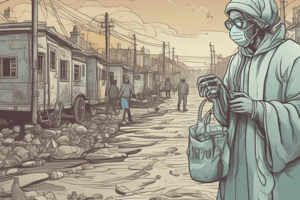Podcast
Questions and Answers
What is a laboratory finding in a patient with cholera?
What is a laboratory finding in a patient with cholera?
- Elevated calcium levels
- Increased bicarbonate level
- Decreased lactate levels
- Elevated serum lactate levels (correct)
What is a characteristic of cholera under dark-field microscopic examination of fresh feces?
What is a characteristic of cholera under dark-field microscopic examination of fresh feces?
- Rapidly moving bacilli in a circular motion
- No bacilli are visible under the microscope
- Slowly moving bacilli in a circular motion
- Rapidly moving bacilli (like shooting stars) (correct)
What is a precaution to be observed when handling a patient with cholera?
What is a precaution to be observed when handling a patient with cholera?
- Do not wear any personal protective equipment
- Observe standard precautions and wear a gown and gloves when handling feces-contaminated articles (correct)
- Observe contact precautions only
- Wear a mask only
What is a benefit of improved sanitation in endemic areas?
What is a benefit of improved sanitation in endemic areas?
What is a recommended precaution for travelers to areas where cholera has occurred?
What is a recommended precaution for travelers to areas where cholera has occurred?
Flashcards are hidden until you start studying
Study Notes
Cholera
- Cholera is an acute enterotoxin-mediated GI infection caused by the gram-negative bacillus Vibrio cholerae.
- It produces profuse, watery diarrhea, vomiting, massive fluid and electrolyte loss, and possibly hypovolemic shock, metabolic acidosis, and death.
- Infection confers only transient immunity.
- Humans are the only hosts and victims of V. cholerae.
- Cholera is transmitted through food and water contaminated with fecal material from carriers or people with active infections.
- Eating shellfish from recognized environmental reservoirs of cholera can also cause infection.
Complications
- Complications associated with cholera include hypoglycemia, severe electrolyte depletion, hypovolemic shock, metabolic acidosis, renal failure, liver failure, bowel ischemia, and bowel infarction.
- Massive fluid and electrolyte losses from diarrhea and vomiting can lead to intense thirst, weakness, loss of skin turgor, wrinkled skin, sunken eyes, pinched facial expression, muscle cramps, cyanosis, oliguria, tachycardia, tachypnea, thready or absent peripheral pulses, falling blood pressure, and fever.
Diagnosis
- Diagnosis requires bacteriologic examination of vomitus, blood, stool smears, or fecal specimens collected by rectal swab.
- Dark-field microscopic examination of fresh feces will show rapidly moving bacilli.
Treatment
- Treatment is supportive, consisting primarily of bed rest and oral fluid replacement.
- I.V. replacement therapy is seldom necessary, but oral tetracycline may be prescribed.
- An oral glucose-electrolyte solution can be substituted for I.V. infusions.
Nursing Considerations
- Monitor output (including stool volume) and I.V. infusion accurately.
- Observe the patient for signs of overhydration, such as neck veins, serial weights, and lung auscultation.
- Perform good hand hygiene before and after contact with the patient or the patient's environment.
- Observe standard precautions and contact precautions as necessary.
Prevention
- Improved sanitation and the administration of cholera vaccine to travelers in endemic areas can control this disease.
- Cholera vaccine confers only 60% to 80% immunity and is effective for only 3 to 6 months.
- Vaccination is impractical in endemic areas.
- Travel precautions to areas where cholera has occurred should include drinking only water that has been boiled or treated with chlorine or iodine.
Studying That Suits You
Use AI to generate personalized quizzes and flashcards to suit your learning preferences.





